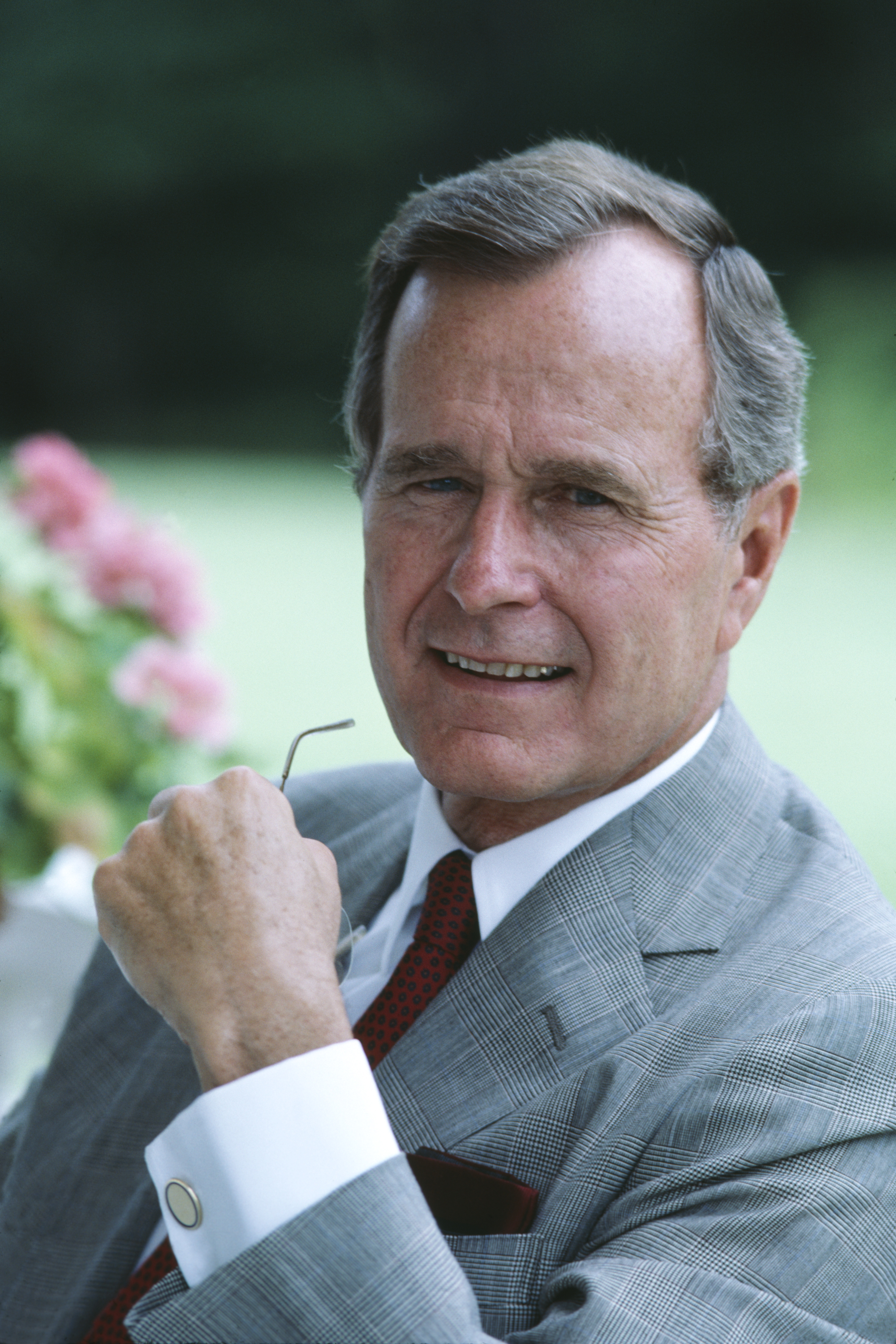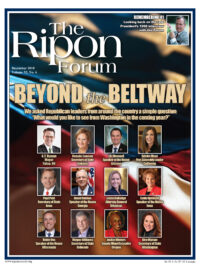
On the balmy August morning George Bush addressed the nation to inform the U.S. of his decision to send American troops into the Persian Gulf, the Ripon Forum was provided a unique opportunity: to meet with President Bush in the Oval Office.
The photo session marked the first time The Ripon Society has met with a present in the White House. Then-Ripon President Don Bliss and Bill McKenzie, who served as editor of the Forum at the time, represented the Society.The meeting took place directly after President Bush had spoken with the Kuwaiti ambassador to the United States. Some of the discussion centered on the Middle East. But the president also recalled his appearance before the Society’s 1985 annual dinner, where he was recognized as “Republican of the Year.”
To mark the 41st President’s passing on November 30th at the age of 94, the Forum has decided to reprint the interview conducted with him that summer. It is a small tribute not only to his past support for The Ripon Society, but to the service and leadership he provided to the American people over the course of his long and distinguished life.
Ripon Forum: The case can be made that foreign policy decisions need no longer be cast in mere bipolar terms. Central Europe, for instance, is now emerging as a more independent group of nations. When you leave office in 1996, what will be the primary poles of power within the world?
President Bush: For many years, it has been clear that the world was becoming multipolar, particularly in political and economic terms. Japan and Western Europe are now major international actors, with the European Community heading toward yet another milestone of unity and consolidation by the end of 1992. The EC is also acting as a magnet to the new democracies of Central and Eastern Europe.
The Soviet Union, whatever its political evolution, will remain a formidable military power. This makes it essential for the United States to remain engaged in the world, particularly in Europe, to maintain the global balance.
China will continue to be a major factor, and will resume an even more important role once it recovers the path of economic and political reform so tragically lost at Tiananmen.
Some of the newly industrialized nations in the developing world have potential to become major players, too, because of their growing economic and technological strength, from Brazil and Argentina to India to the Republic of Korea.
Ripon Forum: Now that some tensions within East-West relations have been reduced, or a few of the conflicts recast, Third World problems may assume greater significance. You are now dealing, for instance, with the Arab nationalism of Iraq’s Saddam Hussein, whose army recently invaded Kuwait. Over the last decade we have also been confronted with more radical elements within the Islamic faith, such as the Shiite Muslims in Iran. How do we begin to reckon with such forces?
President Bush: Third World radicalism remains a serious problem, which may indeed demand more of our attention in a world in which East-West tensions have relaxed. Saddam Hussein represents one extreme form. The spread of ballistic-missile, chemical warfare and nuclear capabilities heightens the danger from North America to Southwest Asia.
These are profound political forces that will not soon pass from the scene. The Middle East promises to be a region of turmoil in the coming decade. The United States needs to remain engaged in the search for peace. The West needs to defend its interests and values against aggression; it needs to stand by its friends in the region who are resisting such forces. The day will come when such extreme policies and philosophies are discredited by their failure to improve the well-being of the people subjected to them.
“Third World radicalism remains a serious problem, which may indeed demand more of our attention in a world in which East-West tensions have relaxed.”
Ripon Forum: You’ve encountered a great deal of political heat over your new position favoring “tax revenue increases.” What do you hope to gain in return from congressional Democrats during the current budget summit?
President Bush: Our goal in these budget negotiations is a lasting resolution of the budget crisis, to end this deficit which has been hanging over the country for years now, and to lead America reinvigorated and competitive into the new century. At the beginning of last May, I announced that the fiscal crisis facing the country was so severe that there would be “no preconditions”—everything was on the table. On June 26th, after a discouraging lack of progress by our Democrat counterparts, I went even farther and said that the situation was severe enough to warrant “entitlement and mandatory program reform, tax revenue increases, growth incentives, discretionary spending reductions, orderly reduction in defense expenditures and budget process reform.”

Now we are into the Fall. If the Democrats don’t get a move on, they will find the government programs decimated by the Gramm—Rudman—Hollings sequester: an across-the-board cut of over one hundred billion dollars in government spending. We would much prefer not to see a sequester take place.
We are still hopeful that the congressional Democrats will cooperate. There is still time and there is certainly a good faith eagerness on our part to move forward. America’s future both economically and as the leading nation of the world depends on a permanent fiscal solution. In that regard, I have advocated for some time now a cut in the capital gains tax rate and real reform in the budget process: a balanced budget amendment, a line-item veto and enhanced rescission power in order to hold the line on spending while being flexible enough to preserve important government programs.
The causes of our budget woes did not come out of nowhere. They are created by our political representatives and they will be solved by them—with the help of groups like the Ripon Society making their voice heard for a return to the tried and true Republican values of common sense.
“The causes of our budget woes did not come out of nowhere. They are created by our political representatives and they will be solved by them—with the help of groups like the Ripon Society.”
Ripon Forum: Let’s move ahead, it’s summer of 1992, and you’re preparing your acceptance speech for the Republican National Convention. What points do you wish to establish at that gathering? What is the theme that will compare to your now famous call for a “kinder, gentler” nation?
President Bush: For me to accept the premise of your question, even hypothetically, would be presumptuous. A president has so many opportunities to be presumptuous that it’s work just making sure you avoid them! So let me simply say that I am flattered by your question and that regardless of what I am doing in 1992, I will certainly still be striving for a kinder, gentler nation —and I am sure the Ripon Society will be as well.
Ripon Forum: At a time when the incidence of unplanned pregnancies and abortion is high, and public differences on abortion are divisive, federal spending on contraceptive education and family planning services is lower in real terms than it was 10 years ago. Do you think the government can do more to assist pregnancy prevention? If not, why not?
President Bush: Certainly the government can do more to prevent unwanted pregnancy. I am very proud of the work that the secretary of health and human services, Dr. Louis Sullivan, has done in spreading the message that we can help those for whom it may seem to be too late. As for others, as Dr. Sullivan said, we must cultivate “a culture of character” in order to instill individual responsibility. Money alone is not the answer. But strengthening the institution of the family is surely part of the answer. I would also add that where unwanted pregnancies do occur, we have encouraged adoption of the child—turning unwanted pregnancies into wanted, cherished children, and we hope to do much more. I have proposed the “Special Needs Adoption Assistance Act of 1989” to help support and encourage adoption of children with special needs by federal employees. We are waiting for Congress to pass that legislation.
Ripon Forum: In the late 1940s, the oil industry, Texas, and the West in general represented America’s future, and for a 24 year-old Yale graduate, they presented quite a challenge. How did your move to Odessa, Texas in 1948 help shape your economic and political views?
President Bush: I like to think that my own move West shaped me in the way that a favorite president of mine, Theodore Roosevelt, was shaped by his own going out West—the way it helped him develop his lifelong appreciation not just for people but for nature. Now when Barbara and I headed West it was in a red Studebaker, not a locomotive. But I’ve always had the same appreciation for the outdoors, and I think it partly explains my determination, like his, to do something about the environment.
I also admire the fact that Teddy Roosevelt was a reformer. He stood for high ethical standards, particularly in public service. That kind of integrity, of always being your own man, is also a hallmark of the West. Many of the reform movements in American history came out of wherever was considered the West—Ripon, Wisconsin is an example.
Reform really means restoring things to their proper state. In that sense, both TR’s conservationism and his trust busting were reforms. It may be that the West exerts a constant force on us, as it did on TR, and as I like to think it does on me: always reminding me that reform is a kind of stewardship, of caring and concern whether for nature, for humanity or for the institutions of humanity.
“A political party is like a choir because it needs two things: a single songbook—and lots of different voices.”
Ripon Forum: You have expressed a keen interest in increasing the base of the Republican party, in particular among black Americans. What is your vision for the GOP? Do you view it as a coalition of different voices or as an organization guided by one or two defining ideas?
President Bush: This is the age of empowerment, and the Republican Party is the party of empowerment. We believe in strengthening families, not multiplying bureaucracies. Republicans think parents should decide which public school is best for their kids. That’s why this administration
has proposed the Education Excellence Act of 1990 to provide incentives among other things for magnet school programs and to provide increased choice for parents in determining their children’s schools. We’ve also unveiled a program to help poor people run or –better yet—own their public housing units. And we support a child care tax credit for low- income working families that will enable them to care for their kids in the manner they choose.
The message of empowerment has great appeal to all Americans, but particularly to those who have been historically disadvantaged. They’re the ones who’ve suffered most from the bureaucratic welfare state. They want something new and something better. And that’s what the Republican Party is offering. Republicans stand together for opportunity, empowerment and strong families. But it’s a big party: we’ve got a wide variety of ideas on how to bring these principles into practice. That’s good. A political party is like a choir because it needs two things: a single songbook — and lots of different voices.




